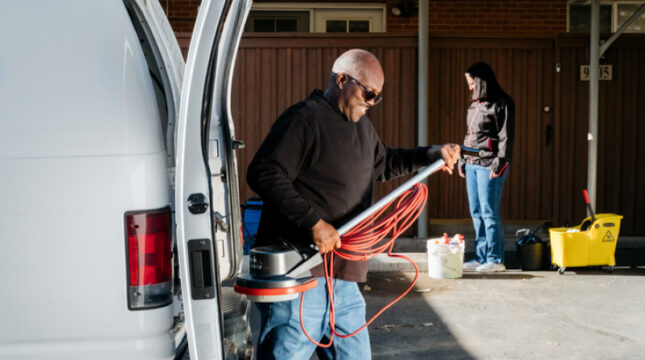Business owners understand the importance of securing funding to launch or fuel their business growth. If you’re ready to start up or take your business to new depths, the Small Business Administration (SBA) has 504 and 7(a) loans that can help.
Before you dive head-first into the loan process, you should know that each loan program has different eligibility requirements, terms and uses. Comparing SBA 504 vs. 7(a) loans to find the perfect fit for your business can feel like navigating choppy waters — but we’re here to help you stay afloat.
Quick jumps:
- Comparing SBA 7(a) vs 504 for small business owners
- What is an SBA 504 loan?
- What is an SBA 7(a) loan?
Comparing SBA 7(a) vs. 504 for small business owners
Your lender can help you decide on the best loan options for your business, but having a basic understanding before you start can help. Also, the SBA allows you to take out multiple loans for your business operations since a single loan might not be enough to meet your financing needs, so its helpful to familiarize yourself with the different types.
Here are some key differences between SBA 504 loans and SBA 7(a) loans.
|
SBA 504 loan |
SBA 7(a) loan |
|
|
Loan purpose |
Existing buildings or land, new facilities, machinery, equipment, improvements to land and existing facilities. |
Real estate, working capital, business debt, furniture, fixtures and supplies. |
|
Maximum loan amount |
Up to $5.5 million |
Up to $5 million |
|
Repayment term |
10, 20, or 25 year terms |
Up to 25 years for real estate or up to 10 years for equipment, working capital or inventory loan. |
|
Down payment |
Typically 10% |
10% to 30% |
|
Interest rate |
Fixed rate |
Fixed and variable rate |
|
Eligibility factors |
Business net worth, net income and for-profit status. |
Income source, credit history and location. |
|
Fees |
Around 3% |
Varies |
What is an SBA 504 loan?
SBA 504 loans offer long-term financing options for fixed assets. You can borrow up to $5 million to acquire real estate, commercial buildings and equipment and to improve existing facilities and land.
Repayment terms are 10, 20 and 25 years. Since the SBA guarantees a part of the loan, interest rates are usually lower than what you’ll find with a conventional lender — making it easier to fit monthly payments into your business’s finances.
SBA 504 loans are best if you:
- Need business financing to purchase, renovate or improve commercial real estate, buildings or equipment.
- Have a business that creates jobs, retains jobs or has a public policy focus.
- Are comfortable with a slower loan application process.
- Prefer a fixed interest rate.
- Are willing to use the asset being financed as collateral.
Eligibility requirements for SBA 504 loans
To be eligible for an SBA 504 loan, you must do business in the U.S. and operate as a for-profit company. You also must have a net worth below $15 million and an average income of less than $5 million for the past two years.
You'll need to steer clear of a few specific activities to qualify, like certain real estate deals, gambling, and illegal activity. Additionally, you shouldn’t have access to funds from the individual owners or the company itself, but you should be able to repay the loan and have a viable business plan.
Loan amount
How much you can borrow depends on how you’ll use the money. For example, you can get up to $5 million if you’re using the funds for job creation, public policy or community development goals. Comparatively, small manufacturers can access up to $5.5 million.
SBA 504 interest rates and fees
SBA 504 loans are fixed-rate loans linked to the 10-year U.S. Treasury bonds market rate. It adds up to about 3% of the loan amount, but you can finance it.
Repayment terms and collateral requirements for SBA 504 loans
If you opt for an SBA 504 loan, 10-, 20-, and 25-year repayment terms are available, depending on your business needs. You'll need to use the financed assets as collateral to secure this type of loan and may be asked to provide a personal guarantee.
How to get an SBA 504 loan
To apply for an SBA 504 loan, you will collaborate with a Certified Development Company (CDC), which is specially trained to guide you through the application process. CDCs will connect you with a qualified lender in your area and help you create a strong loan application.
What is an SBA 7(a) loan?
The SBA 7(a) loan is the most popular option for small business owners with special requirements. The repayment terms range from 10 years to 25 years, depending on how you plan to use the funds.
It’s usually the best option for a real estate purchase since you can’t use the SBA 504 loan for real estate. However, you can also use the 7(a) loan for working capital, equipment, machinery, furniture, fixtures or other materials, new construction, business acquisition or expansion, and debt refinancing under certain conditions.
SBA 7(a) loans are best if you:
- Need to finance inventory or supplies, or to address cash flow gaps.
- Want to buy real estate or equipment without meeting the job creation or public policy goals required by an SBA 504 loan.
- Prefer a quicker loan processing time.
- Want the option of a variable interest rate.
Eligibility requirements for SBA 7(a) loans
SBA 7(a) loans require your business to be profitable, operating in the U.S., and classified as a small business. Before applying, you must have good invested equity and show that you've explored alternative financial resources, including your personal assets. You must not be delinquent on any existing debt obligations to the U.S. government.
Your repayment terms depend on how you’ll use the funds from the loan. You can get up to 25 years to repay real estate loans, while working capital and inventory loans have a ten-year repayment period.
SBA 7(a) loan amounts
Your borrowing limit depends on the type of SBA 7(a) loan you get. Standard 7(a) loans, Export Working Capital loans, and International Trade loans let you borrow up to $5 million. However, the SBA Express and Export Express loans limit you to $500,000, and the 7(a) Small Loan has a cap of just $350,000
Interest rates, fees, and collateral
Your interest rate depends on your loan amount, but you can negotiate with the SBA lender. A lender can't charge more than the SBA maximum rate, which is typically tied to the prime rate, LIBOR rate, or an optional peg rate.
Depending on your loan term, you may be charged a prepayment fee if you pay off your SBA loan early. Before signing, you should always discuss prepayment penalties with your lender to ensure you fully understand the potential consequences.
You may also need to consider collateral. Generally, lenders won’t ask for collateral for loans under $25,000, but it varies by lender.
Repayment terms and collateral requirements for 7a loans
The repayment options for SBA 7(a) loans vary based on what you're using the funds for — you can repay a loan for real estate for up to 25 years. However, you only get 10 years maximum for working capital, equipment, or inventory loans.
How to get an SBA 7(a) loan
You’ll work with a local lender to apply for an SBA 7(a) loan. However, preparing your loan package requires a long list of documentation. Borrower information (SBA Form 1919), financial statements (SBA Form 413), profit and loss statements, business licenses, loan application history of previous loans, resumes for each principal, and business tax returns are among the things your lender will ask for.
How NEXT supports small businesses with their finances
At NEXT, we understand that small businesses need to maintain a solid financial foundation. It’s why our affordable business insurance is customizable to meet your needs.
With our simplified online application process, you can get the coverage you need quickly and easily — in less than 10 minutes, freeing up time and resources you can use to grow your business.
Our licensed, U.S.-based insurance professionals are standing by to help you with questions.





